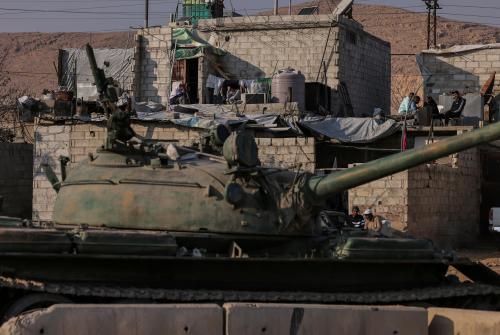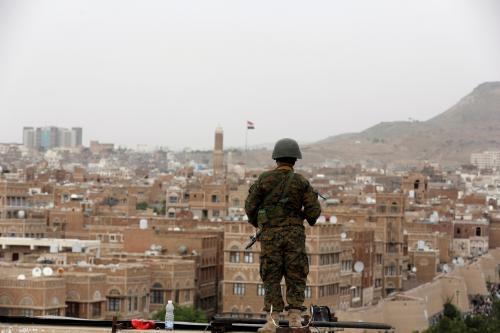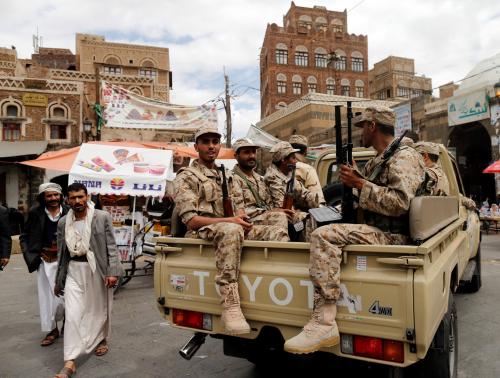

2:30 am AST - 4:30 am AST
Past Event
Content from the Brookings Doha Center is now archived. In September 2021, after 14 years of impactful partnership, Brookings and the Brookings Doha Center announced that they were ending their affiliation. The Brookings Doha Center is now the Middle East Council on Global Affairs, a separate public policy institution based in Qatar.
The Brookings Doha Center (BDC) in partnership with Al Jazeera Center for Studies and the Ibn Khaldon Center for Humanities and Social Sciences held a panel discussion on September 11th, 2019 about the recent developments in Yemen. The panelists focused on the events that have taken place over the past five years, discussing the roles of various Yemeni and international actors.
The panel consisted of a group of distinguished scholars and experts, including: Yaser Al-Yamani, leader of the General People’s Congress in Yemen; Mohammed Al-Bukhaiti, a member of the political wing of Ansar Allah; Bakeel Al-Zandani, head of the Department of International Affairs at Qatar University; and Said Thabit, Al Jazeera Bureau Chief in Yemen. Hamdi Al-Bokari, the Al Jazeera correspondent in Yemen, moderated the event. Members of Doha’s diplomatic, academic, and media communities attended the event.
Yaser Al-Yamani began the discussion with an overview of what has been happening in Yemen over the past five years. He argued that Saudi Arabia and the United Arab Emirates (UAE) have not shown any credibility during this period because, while they claimed to be working to restore legitimacy in Yemen, their actions contradicted this objective. He touched on the “coup” in Aden, attacks on government forces, the prevention of the president and government from returning to Yemen, and the formation of armed militias by the UAE. Al-Yamani also discussed the UAE’s expansion, as well as its efforts to take control of airports, ports, oil and gas sites, and Socotra. Al-Yamani said that Saudi Arabia and the UAE have been working to take Yemen’s wealth, to divide the north from the south, and to fragment the state into militias.
Mohammed Al-Bukhaiti continued the discussion by saying that international aggression toward Yemen is intended to take away Yemen’s sovereignty. He argued that the coalition forces support the Yemeni government because it consults with Saudi Arabia, the UAE, and the United States on every decision. As such, he claimed that the return of the government would prevent Yemen from achieving its interests. Al-Bukhaiti claimed that the 2014 revolution was a revolution against the interference of the United States and other external powers in Yemeni decision-making. He said that Yemen reclaimed its independence in 2014, adding that the Peace and National Partnership Agreement signed in 2014 did not give Ansar Allah any special privileges but that the failure to implement the agreement led to the outbreak of the current war. He accused Ansar Allah’s opponents of being responsible for not implementing the agreement and concluded that way to solve the conflict is through a return to dialogue.
Bakeel Al-Zandani began his speech by discussing the beginning of the crisis in Yemen. He explained that the problem started when the Yemenis began to rely on external actors, which sought to achieve their own interests, without taking Yemen’s interests into consideration. Historically, Yemen has drawn interest from major powers due to its distinctive geography, islands, ports, climate, population density, and resources. Al-Zandani claimed that it is well-known that the larger, stronger Middle Eastern countries are trying to expand at the expense of smaller, weaker states, while these same larger powers are instrumentalized by international decisionmakers.
Said Thabit pointed out that what has been taking place in Yemen is a re-delineation of the geopolitical map, adding that the same thing has been happening in countries like Syria and Iraq. Thabit said that Yemeni youth started a revolution that led to the Comprehensive National Dialogue Conference, in which all Yemeni parties, including the Houthis, participated and agreed on outcomes. He added that regional and international forces soon intervened, supporting the Houthi coup. According to Thabit, Operation Decisive Storm was a means to divide and re-delineate the geopolitical map of Yemen, as indicated by the field operations that were carried out. He also said that Iran, Saudi Arabia, and the UAE are partners in the partition process, adding that the crisis in Yemen is highly intricate and involves many different actors. He concluded by saying that Yemen will not return to what it was and that the southern regions will not accept Houthi rule.
The subsequent question and answer session focused on the future of Yemen and possible ways to resolve the crisis, as well as the role of the Yemeni government. Al-Yamani mentioned that President Abd-Rabbu Mansour Hadi is in Saudi custody and refused to lease Socotra, ports, or airports to the UAE, which then formed armed militias to fight the Yemeni government. Al-Bukhaiti said that Ansar Allah was prompted to start the coup when it was excluded, along with the Southern Movement and the revolutionary youth, by other parties during the National Dialogue Conference. When discussing the future, Al-Zandani said that the only option is to sit down and hold a dialogue among Yemenis, without relying on any regional or external support. Thabit added that there is a need to restart a discussion on the outcomes of the previous dialogue, rather than starting a new one.

March 26, 2025

Thomas Juneau
March 26, 2025

Allison Minor
September 18, 2024